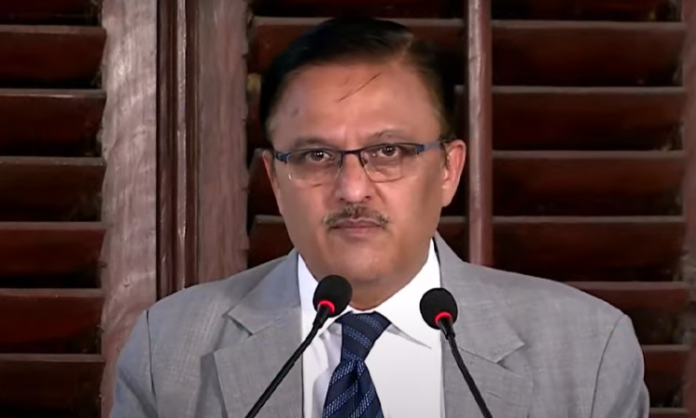– Mohd. Naushad Khan
Last week, Justice Abhay S. Oka, a Supreme Court Judge, while delivering his lecture at Columbia Law School on ‘Hate Speech: Against Religious and Caste Minorities’ said that most incidents of hate speech are made against religious minorities and also shed light on how hate speeches in India have become a tool to bear political dividends and in the process they target religious minorities and oppressed classes.
“There are instances in India where hate speeches are made against the religious minorities and attempts are made to provoke members of the majority to attack a religious minority,” said Justice Oka.
He further said, “Keep aside the penal part of it, whether a speech becomes an offence. But basically, these speeches disturb the social harmony and perhaps the activists will be able to tell you in better fashion, or those who are studying the pattern of hate speech in India very systematically, they will be able to tell you, there can be political reasons also for hate speeches.”
“Maybe some political leaders, for gaining advantage in terms of electoral politics, for gaining advantage to get votes, may be indulging in hate speeches. But that’s a matter of study and it requires study because we always believe that we should have a very healthy democracy and if in a healthy democracy, political elements are going to use hate speeches, it’s a matter of great concern,” he said.
Justice Oka has consistently demonstrated a nuanced and principled approach to matters concerning hate speech. His rulings and observations reflect a deep commitment to balancing the fundamental rights enshrined in the Constitution, particularly freedom of speech and expression, with the imperative to maintain public order and societal harmony.
In April 2022, the Supreme Court, led by Justices A.M. Khanwilkar and Abhay S. Oka, scrutinised the Delhi Police’s investigation into alleged hate speech at a December 2021 event organised by the Hindu Yuva Vahini in Delhi. The bench questioned the thoroughness of the police’s probe, prompting the authorities to file a more detailed affidavit. Justice Oka emphasised the need for rigorous and unbiased investigations in such sensitive matters.
In April 2022, the SC sought the Centre’s response on a plea urging the examination of international laws to formulate stringent measures against hate speech and rumour-mongering. Justice Oka, part of the bench, highlighted the necessity of legislative action to address the growing concerns of hate speech in the digital age.
Justice Oka’s tenure reflects a steadfast commitment to upholding constitutional values, ensuring that freedom of expression is balanced with the need for public order. His judgments and observations serve as a testament to the judiciary’s role in fostering a just, tolerant, and secular society.
There are judgments and judgments of the Supreme Court on different aspects of hate speech. There are judgments which deal with the concept of hate speech. One of these judgments has, in fact, enlisted provisions of various statutes which deal with hate speech. These are all penal statutes. The judgment enlists those hate speeches. There are SC judgments which lay down guidelines for guiding the executive to ensure that there is no hate speech and those who indulge in hate speech are brought to book – they are punished.
In 2024, the India Hate Lab, a Washington-based research group, documented 1,165 instances of hate speech, a 74% increase from 668 cases in 2023. The majority of these incidents targeted Muslims, with Christians also affected. Many incidents occurred during political rallies and religious gatherings, with high-profile figures, including Prime Minister Narendra Modi, accused of fuelling divisive rhetoric.
“The Constitution of India envisages Bharat as a secular nation and fraternity assuring the dignity of the individual and unity and the integrity of the country is the guiding principle enshrined in the Preamble. There cannot be fraternity unless members of community drawn from different religions or castes of the country are able to live in harmony. We feel that this Court is charged with the duty to protect the fundamental rights and also preserve the constitutional values and the secular democratic character of the nation and in particular, the rule of law. The matter needs examination, and some form of interim directions,” the court order said on 21 October, 2022.
“Suo moto action will be taken to register cases even if no complaint is forthcoming and proceed against the offenders in accordance with law. We make it clear that any hesitation to act in accordance with this direction will be viewed as contempt of this Court and appropriate action will be taken against the erring officers. We further make it clear that such action will be taken irrespective of the religion that the maker of the speech or the person who commit such act belongs to, so that the secular character of Bharat as is envisaged by the Preamble, is preserved and protected,” it said.
On its implementation, “Senior Supreme Court lawyer Sanjay Hegde said, “The Supreme Court orders on hate speech are rendered meaningless if not followed in letter and spirit. If police forces do not honour SC order, register suo-motu FIRs and make necessary arrests, the orders will be of no consequence. In each instance it may not be possible for SC to take up contempt proceedings for non-implementation. High Courts must step up and seek explanations from the police authorities and if necessary require the launching of disciplinary proceedings against relevant policemen for non-compliance.”




